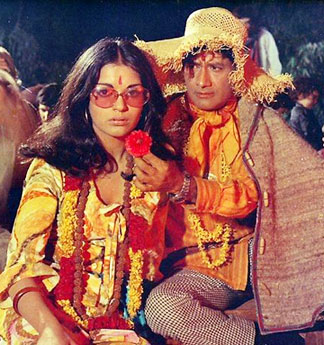
It’s a bitter truth that most of the directorial ventures of Dev Anand are not known for their box office performances. But there is no doubt about the courage and vision his films displayed in terms of subjects, music, presentation, and cast, giving the deserving break to many talented newcomers.
Among the successful films directed by Dev, Hare Rama Hare Krishna (1971) remains at the top, unanimously remembered as the path-breaking project of its times, solely responsible for beginning a new era in Hindi films. Widely known as a trendsetter for its eye-opener subject of drug addiction adapted in the early ’70s, the film also had an outstanding soundtrack (R.D. Burman) showcasing an amazing range. Besides, it is also credited for transforming the way the lead heroine was presented in Hindi cinema breaking all the norms.
Surprisingly, HRHK rarely gets portrayed or talked about as an emotional brother-sister saga, which ironically was not only its key plot, but was also the first presentation of its kind in the history of Hindi cinema. Before HRHK, the brother-sister relationship was largely considered as a sub-plot of a script and the lead heroines avoided such offers with a fear of getting typecast. In fact, there were names known for playing such roles, who kept struggling to get rid of the tag in their entire careers.
HRHK confidently broke that typical pattern of Hindi films and presented its lead actors as brother and sister along with pointing towards the burning social issues of breaking families, suffering kids, and the new Hippie culture’s over-indulgence in drug addiction. The film with the anti-drug message won the attention of the youth and its cult title song ‘Dum Maro Dum’ largely remained the reason for the same.
However, the point I wish to make here is that despite being a film loved and supported by the entire youth of the country, HRHK was not any usual romantic film featuring the charming Dev. On the contrary, it was a tragic story of a broken family in which the brother-sister relationship had the entire focus and the romance was used as a sub-plot, reversing the entire format of a Hindi film.
Dev showed some amazing, unparalleled guts making the film in his prime as one of the leading (romantic) stars of Hindi cinema with an unprecedented fan following. A film with such an unusual theme was also made just after delivering a hugely successful Johny Mera Naam (1970) and the not-so-successful directorial debut in Prem Pujari (1970). Thankfully, his conviction won over every risk and doubt, becoming a success. Plus, Dev’s confidence in the subject also got proved when the second most popular song of the film turned out to be the brother-sister song “Phoolon Ka Taaron Ka Sabka Kehna Hai” along with “Dum Maro Dum” becoming the youth’s anthem.
HRHK was also a brave decision for the newcomer Zeenat Aman (post Hulchul/1971), agreeing to be Dev’s sister on the screen, overcoming all the fears of getting typecast. Post winning the title of ‘Miss Asia’, Zeenat had recently been a part of a lesser-known English film with Dev titled The Evil Within (1970). But the gutsy girl still took the risk and stunned everyone among the viewers and the industry as well. Expectingly, Mumtaz had earlier refused the sister’s role by openly making a confession. As mentioned in Dev’s biography when he asked her ‘Why not?’, then she said, ’For I don’t feel like one when you are with me.”
In the present world, just give it a thought, if any leading Khan, Kumar, or Kapoor will have such guts to direct a film in his prime, focusing on a brother-sister relationship, casting a gorgeous ‘Miss India/Asia’ in the role of his sister?
As revealed by Dev, he got the basic idea of his script revolving around an Indian girl caught in the illusionary world of hippies, post-meeting a real-life Janice in Kathmandu. The girl’s original name was also Jasbir, who was now living life on her terms, post her parents got divorced.
Interestingly, as the film began with an inspiration from a real-life character, it also resulted in a similar emotional incident many years later, when Dev got a letter from a father of a girl in America. The letter thanked Dev for making the film as it helped them find their missing daughter after many years. The family spotted their girl in a sequence of the film standing in the backdrop and then finally managed to trace her making further queries.
So, while the brother-sister in HRHK couldn’t live happily ever after because of its tragic climax, the film made it possible for a real-life family, finding their daughter/sister back, cherishing their blessed reunion. That’s exactly how cinema contributes a lot to our personal journeys of life in various ways.
Bobby Sing
BobbyTalksCinema.com
NOTE : The article was first published in my Sunday column in THE FREE PRESS JOURNAL Newspaper (Mumbai Edition) on 22nd August 2021.
Note: The chapter is also a part of my upcoming book DID YOU KNOW Vol. 2. in which it will be there in much details.
----------
 For more interesting articles on lesser known facts on Hindi Cinema, do try DID YOU KNOW Series by Bobby Sing available in both Book and E-book form.
For more interesting articles on lesser known facts on Hindi Cinema, do try DID YOU KNOW Series by Bobby Sing available in both Book and E-book form.
Also available
at Flipkart, Infibeam and Notionpress stores (in India)
And at Amazon-com and Amazon-co-uk abroad.
The E-book available at Amazon Kindle, Google Play, I-Books and Kobo.
Hope all friends opting for it have a good time reading.


 For more interesting articles on lesser known facts on Hindi Cinema, do try DID YOU KNOW Series by Bobby Sing available in both Book and E-book form.
For more interesting articles on lesser known facts on Hindi Cinema, do try DID YOU KNOW Series by Bobby Sing available in both Book and E-book form.